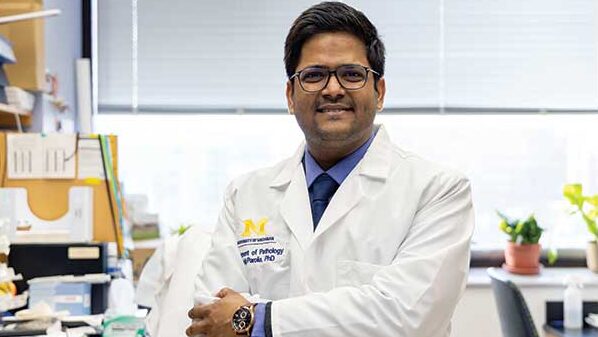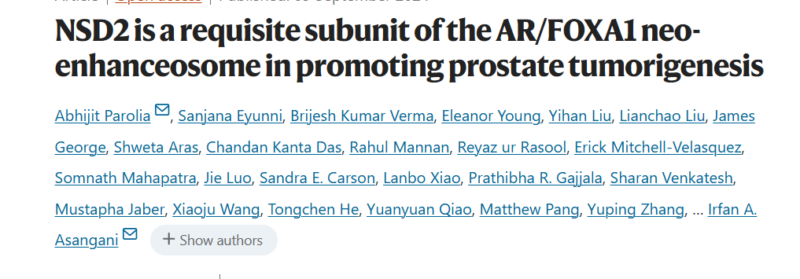
Targeting of NSD1/2 could be an effective strategy for treating advanced Prostate Cancer – Advanced Prostate Cancer Consensus Conference
Advanced Prostate Cancer Consensus Conference posted on LinkedIn about recent paper by Abhijit Parolia et al., titled “NSD2 is a requisite subunit of the AR/FOXA1 neo-enhanceosome in promoting prostate tumorigenesis” published on Nature Genetics.
Authors: Abhijit Parolia, Sanjana Eyunni, Brijesh Kumar Verma, Eleanor Young, Yihan Liu, Lianchao Liu, James George, Shweta Aras, Chandan Kanta Das, Rahul Mannan, Reyaz ur Rasool, Erick Mitchell-Velasquez, Somnath Mahapatra, Jie Luo, Sandra E. Carson, Lanbo Xiao, Prathibha R. Gajjala, Sharan Venkatesh, Mustapha Jaber, Xiaoju Wang, Tongchen He, Yuanyuan Qiao, Matthew Pang, Yuping Zhang, Irfan A. Asangani.

“NSD2 is a requisite subunit of the AR/FOXA1 neo-enhanceosome in promoting prostate tumorigenesis out on Nature Genetics
The androgen receptor (AR), a key transcription factor involved in prostate cell differentiation, undergoes significant changes in its chromatin binding in Prostate Cancer leading to tumor-promoting activities. This study identifies the enzyme NSD2, a histone methyltransferase, as a critical player in this process. NSD2 is abnormally expressed in prostate cancer and facilitates AR’s ability to activate tumor-specific genes by regulating over 65% of AR binding sites. These AR sites feature a unique FOXA1:AR motif found in tumor cells. Inhibiting NSD2 weakens AR activity and increases reliance on the related enzyme NSD1, suggesting that dual targeting of NSD1/2 could be an effective strategy for treating advanced Prostate Cancer.”
Source: Advanced Prostate Cancer Consensus Conference/LinkedIn
-
ASCO Annual Meeting
May 30 - June 4, 2024
-
Yvonne Award 2024
May 31, 2024
-
OncoThon 2024, Online
Feb. 15, 2024
-
Global Summit on War & Cancer 2023, Online
Dec. 14-16, 2023
